
Recherche et Pratiques Pedagogiques en Langues de Specialite-Cahiers de l Apliut
Scope & Guideline
Cultivating Excellence in Specialized Language Education.
Introduction
Aims and Scopes
- Interdisciplinary Approaches in Language Education:
The journal encourages research that combines insights from various disciplines, enhancing the teaching of languages for specific purposes (LSP) through methodologies borrowed from fields such as linguistics, education, and technology. - Competency-Based Education:
A key focus is on competency-based approaches to language teaching, emphasizing the development of practical skills and competencies that learners need in specific professional contexts. - Digital Integration in Language Learning:
The journal explores the impact of digital technologies on language learning and teaching, including blended learning environments and digital resources that support language acquisition. - Innovative Pedagogical Practices:
Research on innovative teaching methodologies, such as project-based learning, flipped classrooms, and the use of visual and interactive tools, is a consistent theme, aiming to improve student engagement and learning outcomes. - Assessment and Evaluation in Language Education:
The journal addresses issues related to assessment methods and practices in language education, promoting research on effective evaluation strategies that align with contemporary educational standards.
Trending and Emerging
- Cross-Disciplinary Skills Development:
Recent publications emphasize the importance of integrating cross-disciplinary skills into language education, reflecting a broader understanding of the competencies required in today's professional environments. - Blended and Online Learning Environments:
There is a marked increase in research focusing on blended and online learning, particularly in the context of the COVID-19 pandemic, highlighting the need for effective digital solutions in language teaching. - Intercultural Communication and Exchange:
Emerging themes include the significance of intercultural communication and virtual exchange programs, which foster global learning experiences and enhance language acquisition through cultural interactions. - Use of Visual and Interactive Tools:
The journal is increasingly featuring studies on the application of visual aids and interactive tools in language teaching, which support comprehension and retention among learners. - Professional Competency Mapping in Language Education:
There is a growing focus on integrating professional competency maps into language curricula, ensuring that language education aligns with the needs of specific industries and professions.
Declining or Waning
- Traditional Language Teaching Methods:
There is a noticeable decline in papers focusing on traditional, teacher-centered methodologies, as the field increasingly embraces more interactive and student-centered approaches. - General Language Proficiency Assessments:
Research centered on broad language proficiency assessments appears to be waning, as the emphasis shifts towards more specific competencies relevant to particular professional contexts. - Static Curriculum Designs:
The exploration of static, one-size-fits-all curriculum designs is decreasing, with a growing focus on personalized and adaptive learning strategies that cater to diverse learner needs. - Linguistic Theory without Practical Application:
There seems to be a reduction in studies that discuss linguistic theories in isolation from their practical application in teaching contexts, as the journal promotes research that bridges theory and practice.
Similar Journals
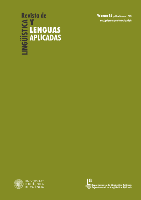
Revista de Linguistica y Lenguas Aplicadas
Empowering Voices Through Open Access KnowledgeRevista de Linguistica y Lenguas Aplicadas, an esteemed journal published by UNIV POLITECNICA VALENCIA, EDITORIAL UPV, is a pivotal resource in the field of linguistics and applied languages. Since its inception, the journal has embraced Open Access publishing since 2006, ensuring that its rich repository of research is readily available to a global audience of researchers, academics, and language professionals. Headquartered in Valencia, Spain, the journal contributes significantly to the advancement of linguistics knowledge, boasting a respectable ranking within the Q3 quartile for Linguistics and Language (2023) according to Scopus metrics. It covers a diverse range of topics and methodologies, engaging readers through its commitment to scholarly rigor and innovation. The journal is uniquely positioned to inform and inspire essential discussions from 2015 to 2024, making it a vital platform for emerging linguists and seasoned scholars alike, as they explore the evolving landscapes of language and communication.
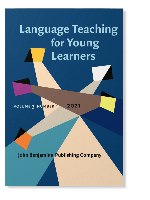
Language Teaching for Young Learners
Cultivating a passion for languages from an early age.Language Teaching for Young Learners, published by John Benjamins Publishing Co, is a premier journal dedicated to enhancing the pedagogy of language acquisition in early childhood education. Since its inception in 2019, it has rapidly established itself within the research community, reflected by its high Scopus rankings—placing it in the 85th percentile for Language and Linguistics and the 84th percentile for Education. The journal aims to provide a platform for innovative research, practical insights, and theoretical discussions surrounding the teaching of languages to young learners, thus contributing significantly to the fields of Education and Linguistics. With an open access model currently unavailable, it caters to a diverse global audience, including researchers, educators, and policy-makers, keen on improving pedagogical practices. Located in the Netherlands, the journal's commitment to academic excellence is evident through its Q1 and Q2 rankings in Linguistics and Language and Education respectively, encouraging continual discourse in cultivating effective language education practices.
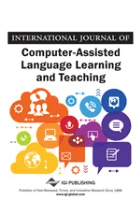
International Journal of Computer-Assisted Language Learning and Teaching
Pioneering research at the intersection of language and tech.Welcome to the International Journal of Computer-Assisted Language Learning and Teaching, a premier publication by IGI Global dedicated to advancing the interdisciplinary research at the intersection of linguistics, education, and computer science. With an ISSN of 2155-7098 and an E-ISSN of 2155-7101, this journal aims to provide a platform for innovative studies on the implementation and effectiveness of technology in language learning and teaching. The journal has earned notable recognition within its field, securing a Q1 ranking in Linguistics and Language and strong placements across several categories in the 2023 Scopus Ranks, including a Q3 classification in Computer Science Applications and Computer Vision and Pattern Recognition. Researchers and educators are encouraged to contribute their findings to foster dialogue around effective computer-assisted methodologies and instructional practices. Although the journal is not open access, it remains a vital resource for researchers, professionals, and students seeking to enhance the efficacy of language education through technological innovation.

Language Learning in Higher Education
Pioneering insights into contemporary language education challenges.Language Learning in Higher Education is a prominent academic journal published by DE GRUYTER MOUTON, dedicated to exploring the intricate dynamics of language acquisition and pedagogical practices within the higher education context. With a robust ISSN: 2191-611X and E-ISSN: 2191-6128, this journal provides a platform for innovative research that addresses contemporary challenges and methodologies in language education. The journal enjoys a favorable reputation in the academic community, as evidenced by its ranks in the Scopus database, where it holds a position in the 67th percentile for Language and Linguistics and is classified in the Q3 and Q2 quartiles across relevant education and linguistics categories. Since its convergence in 2017, Language Learning in Higher Education aims to enrich scholarly discourse by publishing high-quality articles that foster insights into effective language learning strategies, thus serving as an essential resource for researchers, educators, and students committed to enhancing language education. The journal's editorial team is devoted to advancing the field through rigorous peer-review processes and welcomes contributions that push the boundaries of language learning research.

Journal of Teaching English for Specific and Academic Purposes
Fostering Excellence in Academic Language Teaching.Journal of Teaching English for Specific and Academic Purposes, published by UNIV NIS, FAC SCI MATH, is a pivotal platform for researchers, educators, and practitioners in the field of language education, particularly focusing on specialized and academic English instruction. With an ISSN of 2334-9182 and an E-ISSN of 2334-9212, this journal serves as a conduit for innovative research and pedagogical advancements from 2019 to 2024, contributing significantly to the understanding of language teaching methodologies. As a recognized entity in the Q3 category of Education as per 2023 evaluations, it ranks #1071 in Scopus’s social sciences education realm, indicating its growing influence and relevance. Although it operates without open access, the journal aims to provide a comprehensive exploration of effective teaching strategies and academic practices, crucial for both current scholars and institutions. The journal welcomes diverse contributions that shed light on the evolving landscape of English language teaching, making it an essential resource for those striving to enhance their knowledge and practice in this important area.

Journal of Technology and Chinese Language Teaching
Harnessing Technology for Effective Chinese TeachingJournal of Technology and Chinese Language Teaching, published by JOURNAL TECHNOLOGY & CHINESE LANGUAGE TEACHING, serves as an influential platform for scholars and practitioners in the intersecting fields of technology, language education, and linguistic research. With an ISSN of 1949-260X, this journal strives to disseminate cutting-edge research and innovative practices aimed at enhancing the teaching and learning of Chinese language through technological advancements. Operated from the United States, it currently occupies valuable quartiles within its categories, showcasing its significance—ranking Q4 in Computer Science Applications, Q3 in Education, and Q2 in Linguistics and Language. As it spans from 2019 to 2024, the journal provides a rich repository for international contributions, fostering a collaborative environment for educators, researchers, and students alike. With both Scopus and HIndex metrics reflecting a solid reputation, the Journal of Technology and Chinese Language Teaching is pivotal for those keen on pushing the boundaries of language instruction in the digital age.

TESL Canada Journal
Empowering Educators with Cutting-Edge InsightsTESL Canada Journal, published by TESL Canada, serves as a vital resource for researchers, educators, and practitioners in the field of English as a Second Language (ESL) and applied linguistics. With its commitment to advancing scholarship and best practices in language education, this esteemed journal fosters a platform for the dissemination of high-quality research and innovative pedagogical approaches. Although it operates without open access, its comprehensive articles and reviews offer valuable insights into current trends and challenges faced by ESL educators across Canada and internationally. The journal is dedicated to promoting a deeper understanding of language acquisition processes and instructional methodologies, contributing significantly to the professional development of its readership. Located in Burnaby, Canada, the journal aims to bridge the gap between theory and practice, making it an indispensable source for educators and researchers looking to enhance their expertise in ESL education.
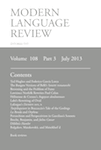
MODERN LANGUAGE REVIEW
Cultivating Knowledge in Linguistic and Literary ContextsMODERN LANGUAGE REVIEW, published by the Modern Humanities Research Association, is a pivotal academic journal based in the United Kingdom, focusing on the fields of linguistics, literature, and literary theory. With an ISSN of 0026-7937 and an E-ISSN of 2222-4319, this journal serves as a platform for disseminating research that explores the nuances of language and its literary contexts. Although currently not an open-access publication, it provides valuable insight into a range of topics, contributing to a deeper understanding of human communication and expression. Covering a wide scope with a publication history from 2002 to 2024, the journal is indexed in Scopus and holds a Q4 ranking in both linguistics and literature categories, indicating its emerging influence within these academic disciplines. As the landscape of humanities research continues to evolve, MODERN LANGUAGE REVIEW remains a vital resource for scholars, professionals, and students aiming to engage with contemporary debates and developments in language and literature.

Argentinian Journal of Applied Linguistics
Exploring the intersections of language, culture, and education.The Argentinian Journal of Applied Linguistics is a prominent publication dedicated to advancing the field of linguistics with a particular focus on practical applications within various contexts. Published by the Federación Argentina de Asociaciones Profesionales de Profesores de Inglés (FAAP), this journal serves as a vital platform for researchers, educators, and linguistics professionals interested in the nuances of language teaching, acquisition, and sociolinguistics. With an ISSN of 2314-3576, the journal showcases original research and reviews that push the boundaries of current knowledge and practice in applied linguistics. Despite being in its early stages, the journal aims to build a strong academic presence by fostering collaboration among scholars and practitioners, thereby contributing to the enhancement of language education in Argentina and beyond. The importance of this journal lies not only in its commitment to accessibility and knowledge dissemination but also in its role as a bridge between linguistic theory and practical application, ultimately benefiting educators and learners alike.
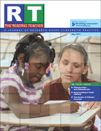
READING TEACHER
Connecting research to practice in reading education.READING TEACHER is a premier journal dedicated to the field of literacy and language education, published by Wiley. With a robust impact factor and a distinguished Q1 ranking in Linguistics and Language, this highly regarded journal serves as an essential resource for educators, researchers, and students aiming to enhance reading instruction and literacy development. The journal covers a broad range of topics within the domain of language and literacy, offering insights into innovative teaching methodologies, research on reading behaviors, and best practices for educational engagement. As the field continues to evolve, READING TEACHER remains committed to advancing scholarship through rigorous peer-reviewed research. Researchers and practitioners can access articles from the journal to stay updated on the latest findings and trends shaping literacy education. For those engaged in the critical study of language acquisition and reading instruction, READING TEACHER is an invaluable part of their academic journey.